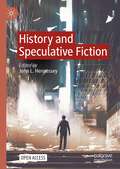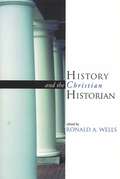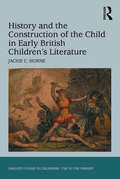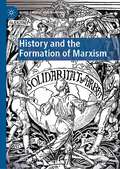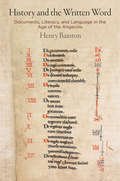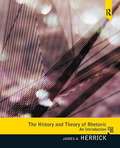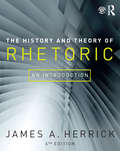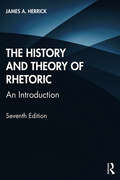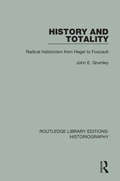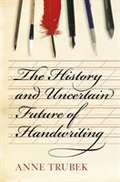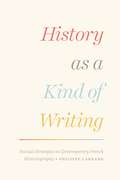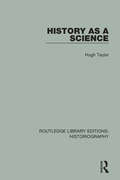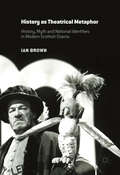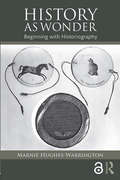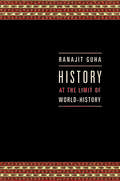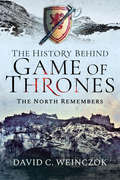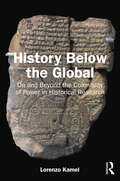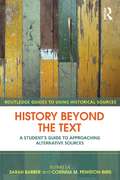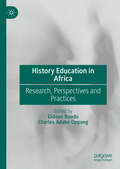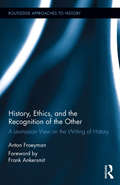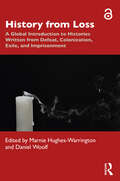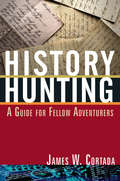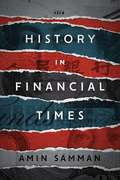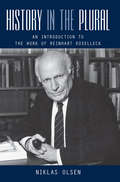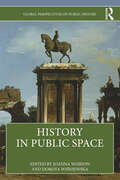- Table View
- List View
History and Speculative Fiction
by John L. HennesseyThis open access book demonstrates that despite different epistemological starting points, history and speculative fiction perform similar work in “making the strange familiar” and “making the familiar strange” by taking their readers on journeys through space and time. Excellent history, like excellent speculative fiction, should cause readers to reconsider crucial aspects of their society that they normally overlook or lead them to reflect on radically different forms of social organization. Drawing on Gunlög Fur’s postcolonial concept of concurrences, and with contributions that explore diverse examples of speculative fiction and historical encounters using a variety of disciplinary approaches, this volume provides new perspectives on colonialism, ecological destruction, the nature of humanity, and how to envision a better future.
History and the Christian Historian
by Ronald A. WellsThis volume arises out of special concerns of historians who are also Christians. What case can be made for connecting historical work and religious convictions? What is the relation of faith to history? What difference could Christian perspectives make in historical study? Thirteen respected scholars — including some who have changed the face of history writing in the twentieth century — here take up a diversity of subjects in giving a provisional answer to these important questions. In exploring foundational issues of perspective and theory, engaging discrete themes such as feminism, puritanism, and missiology, and discussing the application of religious insights in teaching history, this excellent collection of essays forthrightly addresses the &“epistemological crisis&” brought on by the postmodern critique of truth and demonstrates the positive implications of a Christian perspective for the study of history and historiography.
History and the Construction of the Child in Early British Children's Literature (Studies in Childhood, 1700 to the Present)
by Jackie C. HorneHow did the 'flat' characters of eighteenth-century children's literature become 'round' by the mid-nineteenth? While previous critics have pointed to literary Romanticism for an explanation, Jackie C. Horne argues that this shift can be better understood by looking to the discipline of history. Eighteenth-century humanism believed the purpose of history was to teach private and public virtue by creating idealized readers to emulate. Eighteenth-century children's literature, with its impossibly perfect protagonists (and its equally imperfect villains) echoes history's exemplar goals. Exemplar history, however, came under increasing pressure during the period, and the resulting changes in historiographical practice - an increased need for reader engagement and the widening of history's purview to include the morals, manners, and material lives of everyday people - find their mirror in changes in fiction for children. Horne situates hitherto neglected Robinsonades, historical novels, and fictionalized histories within the cultural, social, and political contexts of the period to trace the ways in which idealized characters gradually gave way to protagonists who fostered readers' sympathetic engagement. Horne's study will be of interest to specialists in children's literature, the history of education, and book history.
History and the Formation of Marxism (Marx, Engels, and Marxisms)
by Bertel NygaardThis book redefines the relationship between Marxism and history. At its roots, Marxism was aimed at analyzing society in order to change it, reflecting on the past to create the ‘poetry of the future.’ No single event of the past was as important to early Marxists as the French Revolution of 1789. Studying the varying uses of the history of that past event among Karl Marx, Friedrich Engels, and prominent European Marxists before 1914 (Karl Kautsky, V.I. Lenin, and others), this book argues that we should take the historiography of concrete past events seriously. It was not only an auxiliary element of Marxism, but a core constitutive element in its formation. Thus, this book calls for transcending traditional approaches to Marxism as a fixed set of social theories combined with strategies for the present and future. Important to students of Marxism, the labor movement, and the French Revolution alike, this study contains refreshing perspectives on the interplay between past, present, and future and on the role of states, social classes, socio-economic determination, and political organization in history.
History and the Written Word: Documents, Literacy, and Language in the Age of the Angevins (The Middle Ages Series)
by Henry BaintonComing upon the text of a document such as a charter or a letter inserted into the fabric of a medieval chronicle and quoted in full or at length, modern readers might well assume that the chronicler is simply doing what good historians have always done—that is, citing his source as evidence. Such documentary insertions are not ubiquitous in medieval historiography, however, and are in fact particularly characteristic of the history-writing produced by the Angevins in England and Northern France in the later twelfth century.In History and the Written Word, Henry Bainton puts these documentary gestures center stage in an attempt to understand what the chroniclers were doing historiographically, socially, and culturally when they transcribed a document into a work of history. Where earlier scholars who have looked at the phenomenon have explained this increased use of documents by considering the growing bureaucratic state and an increasing historiographical concern for documentary evidence, Bainton seeks to resituate these histories, together with their authors and users, within literate but sub-state networks of political power. Proposing a new category he designates "literate lordship" to describe the form of power with which documentary history-writing was especially concerned, he shows how important the vernacular was in recording the social lives of these literate lords and how they found it a particularly appropriate medium through which to record their roles in history.Drawing on the perspectives of modern and medieval narratology, medieval multilingualism, and cultural memory, History and the Written Word argues that members of an administrative elite demonstrated their mastery of the rules of literate political behavior by producing and consuming history-writing and its documents.
The History and Theory of Rhetoric: An Introduction (Subscription)
by James A. HerrickThe History and Theory of Rhetoric offers discussion of the history of rhetorical studies in the Western tradition, from ancient Greece to contemporary American and European theorists that is easily accessible to students. By tracing the historical progression of rhetoric from the Greek Sophists of the 5th Century B.C. all the way to contemporary studies-such as the rhetoric of science and feminist rhetoric-this comprehensive text helps students understand how persuasive public discourse performs essential social functions and shapes our daily worlds. Students gain conceptual framework for evaluating and practicing persuasive writing and speaking in a wide range of settings and in both written and visual media. Known for its clear writing style and contemporary examples throughout, The History and Theory of Rhetoric emphasizes the relevance of rhetoric to today's students.
The History and Theory of Rhetoric: An Introduction
by James A. HerrickThe History and Theory of Rhetoric offers an accessible discussion of the history of rhetorical studies in the Western tradition, from ancient Greece to contemporary American and European theorists. By tracing the historical progression of rhetoric from the Greek Sophists of the 5th Century B. C. to contemporary studies--such as the rhetoric of science and feminist rhetoric--this concise yet comprehensive text helps students better understand what rhetoric is and what unites differing rhetorical theories throughout history.
The History and Theory of Rhetoric: An Introduction
by James A. HerrickBy tracing the traditional progression of rhetoric from the Greek Sophists to contemporary theorists, this textbook gives students a conceptual framework for evaluating and practicing persuasive writing and speaking in a wide range of settings and in both written and visual media. The book’s expansive historical purview illustrates how persuasive public discourse performs essential social functions and shapes our daily worlds, drawing on the ideas of some of history’s greatest thinkers and theorists. The seventh edition includes greater attention to non-Western rhetorics, feminist rhetorics, the rhetoric of science, and European and American critical theory. Known for its clear writing style and contemporary examples throughout, The History and Theory of Rhetoric emphasizes the relevance of rhetoric to today’s students. This revised edition serves as a core textbook for rhetoric courses in both English and communication programs covering both the historical tradition of rhetoric and contemporary rhetoric studies. This edition includes an instructor’s manual and practice quizzes for students at www.routledge.com/cw/herrick
History and Totality: Radical Historicism From Hegel to Foucault (Routledge Library Editions: Historiography)
by John GrumleyIn this work, originally published in 1989, the author establishes a tradition of radical historicism from Hegel to the Budapenst School. He charts both its continuous evolution from the early 19th century to the late 20thh, and its transformation in the context of European social, economic and cultural change. Through a reappraisal of historical interpretation from Hegel to Foucault, the book demonstrates the contemporary relevance of radical historicism. It includes detailed analyses of Marx, Dilthey, Simmel, Weber, Lukácks, Horkheimer, Adorno and Habermas.
The History and Uncertain Future of Handwriting
by Anne TrubekIn the digital age of instant communication, handwriting is less necessary than ever before, and indeed fewer and fewer school children are being taught how to write in cursive. Signatures--far from John Hancock’s elegant model--have become scrawls. In her recent and widely discussed and debated essays, the author argues that the decline and even elimination of handwriting from daily life does not signal a decline in civilization, but rather the next stage in the evolution of communication. In this book, the author uncovers the long and significant impact handwriting has had on culture and humanity--from the first recorded handwriting on the clay tablets of the Sumerians some four thousand years ago and the invention of the alphabet as we know it, to the rising value of handwritten manuscripts today. Each innovation over the millennia has threatened existing standards and entrenched interests: Indeed, in ancient Athens, Socrates and his followers decried the very use of handwriting, claiming memory would be destroyed; while Gutenberg’s printing press ultimately overturned the livelihood of the monks who created books in the pre-printing era. And yet new methods of writing and communication have always appeared. Establishing a novel link between our deep past and emerging future. The author offers a colorful lens through which to view our shared social experience.
History as a Kind of Writing: Textual Strategies in Contemporary French Historiography
by Philippe CarrardIn academia, the traditional role of the humanities is being questioned by the “posts”—postmodernism, poststructuralism, and postfeminism—which means that the project of writing history only grows more complex. In History as a Kind of Writing, scholar of French literature and culture Philippe Carrard speaks to this complexity by focusing the lens on the current state of French historiography. Carrard’s work here is expansive—examining the conventions historians draw on to produce their texts and casting light on views put forward by literary theorists, theorists of history, and historians themselves. Ranging from discussions of lengthy dissertations on 1960s social and economic history to a more contemporary focus on events, actors, memory, and culture, the book digs deep into the how of history. How do historians arrange their data into narratives? What strategies do they employ to justify the validity of their descriptions? Are actors given their own voice? Along the way, Carrard also readdresses questions fundamental to the field, including its necessary membership in the narrative genre, the presumed objectivity of historiographic writing, and the place of history as a science, distinct from the natural and theoretical sciences.
History As A Science (Routledge Library Editions: Historiography)
by Hugh TaylorExamining why the study of history as a science was not as advanced as other disciplines, the author of this book, originally published in 1933, examines the arguments in the controversy of what the object of history should be. He then discusses the impact of the study of history on government, war and revolution .
History as Theatrical Metaphor
by Ian BrownThis revelatory study explores how Scottish history plays, especially since the 1930s, raise issues of ideology, national identity, historiography, mythology, gender and especially Scottish language. Covering topics up to the end of World War Two, the book addresses the work of many key figures from the last century of Scottish theatre, including Robert McLellan and his contemporaries, and also Hector MacMillan, Stewart Conn, John McGrath, Donald Campbell, Bill Bryden, Sue Glover, Liz Lochhead, Jo Clifford, Peter Arnott, David Greig, Rona Munro and others often neglected or misunderstood. Setting these writers' achievements in the context of their Scottish and European predecessors, Ian Brown offers fresh insights into key aspects of Scottish theatre. As such, this represents the first study to offer an overarching view of historical representation on Scottish stages, exploring the nature of 'history' and 'myth' and relating these afresh to how dramatists use - and subvert - them. Engaging and accessible, this innovative book will attract scholars and students interested in history, ideology, mythology, theatre politics and explorations of national and gender identity.
History as Wonder: Beginning with Historiography
by Marnie Hughes-WarringtonHistory and Wonder is a refreshing new take on the idea of history that tracks the entanglement of history and philosophy over time through the key idea of wonder. From Ancient Greek histories and wonder works, to Islamic curiosities and Chinese strange histories, through to European historical cabinets of curiosity and on to histories that grapple with the horrors of the Holocaust, Marnie Hughes-Warrington unpacks the ways in which historians throughout the ages have tried to make sense of the world, and to change it. This book considers histories and historians across time and space, including the Ancient Greek historian Polybius, the medieval texts by historians such as Bede in England and Ibn Khaldun in Islamic Historiography, and the more recent works by Martin Heidegger, Luce Irigaray and Ranajit Guha among others. It explores the different ways in which historians have called upon wonder to cross boundaries between the past and the present, the universal and the particular, the old and the new, and the ordinary and the extraordinary. Promising to both delight and unsettle, it shows how wonder works as the beginning of historiography. Accessible, engaging and wide-ranging, History as Wonder provides an original addition to the field of historiography that is ideal for those both new to and familiar with the study of history.
History at the Limit of World-History (Italian Academy Lectures)
by Ranajit GuhaThe past is not just, as has been famously said, another country with foreign customs: it is a contested and colonized terrain. Indigenous histories have been expropriated, eclipsed, sometimes even wholly eradicated, in the service of imperialist aims buttressed by a distinctly Western philosophy of history. Ranajit Guha, perhaps the most influential figure in postcolonial and subaltern studies at work today, offers a critique of such historiography by taking issue with the Hegelian concept of World-history. That concept, he contends, reduces the course of human history to the amoral record of states and empires, great men and clashing civilizations. It renders invisible the quotidian experience of ordinary people and casts off all that came before it into the nether-existence known as "Prehistory."On the Indian subcontinent, Guha believes, this Western way of looking at the past was so successfully insinuated by British colonization that few today can see clearly its ongoing and pernicious influence. He argues that to break out of this habit of mind and go beyond the Eurocentric and statist limit of World-history historians should learn from literature to make their narratives doubly inclusive: to extend them in scope not only to make room for the pasts of the so-called peoples without history but to address the historicality of everyday life as well. Only then, as Guha demonstrates through an examination of Rabindranath Tagore's critique of historiography, can we recapture a more fully human past of "experience and wonder."
The History Behind Game of Thrones: The North Remembers
by David C. WeinczokThe true history behind the hit HBO fantasy show and George R. R. Martin&’s bestselling Fire and Ice series. A wall in the distant north cuts the world in two. Ruthless sea-born warriors raid the coasts from their war galleys. A young nobleman and his kin are slaughtered under a banner of truce within a mighty castle. A warrior king becomes a legend when he smites his foe with one swing of his axe during a nation-forging battle. Yet this isn&’t Westeros—it&’s Scotland. Game of Thrones is history re-imagined as fantasy. The History Behind Game of Thrones turns the tables, using George R. R. Martin&’s extraordinary fictional universe as a way to understand the driving forces and defining moments from Scotland&’s story. Why were castles so important? Was there a limit to the powers a medieval king could use—or abuse? What was the reality of being under siege? Was there really anything that can compare to the destructive force of dragons? By joining forces, Westeros and Scotland hold the answers. Writer and presenter David C. Weinczok draws on a vast array of characters, events, places, and themes from Scottish history that echo Game of Thrones at every dramatic turn. Visit the castle where the real Red Wedding transpired, encounter the fearsome historical tribes beyond Rome&’s great wall, learn how a blood-red heart became the most feared sigil in Scotland, and much more. By journey&’s end, the cogs in the wheels of Martin&’s world and Scottish history will be laid bare, as well as the stories of those who tried to shape—and sometimes even break—them.
History Below the Global: On and Beyond the Coloniality of Power in Historical Research
by Lorenzo KamelHistory Below the Global aims to foster an entangled knowledge of global history, and to place "others" at the centre stage, to better understand the fluid world which we inhabit.Relying on primary sources in seven languages and books written by hundreds of African, Asian, Middle Eastern and South American scholars, Lorenzo Kamel examines the coloniality of power in historical research and sheds light on the largely neglected roles of the "others" and their modernities in history. The book provides three elements combined. Firstly, a thorough analysis of the process of accumulation (“knowledge piece by piece”) which underpins some of the major achievements in human history. Secondly, a view on pre-colonial perspectives and the process through which the latter have been swallowed up by Eurocentric and solipsistic perceptions. Lastly, a study of the roots and outcomes of colonialisms and their echoes in our present. These three elements are addressed by combining multiple methodologies and approaches, in the awareness that the history analysed, as well as the historiographical trajectories that underlie it, are ultimately inter-penetrable, as well as themselves the result of a process of accumulation. History Below the Global challenges the view that, first and foremost, the “West”, for bad and for good, is and was the centre: the proactive actor which did and undid.This volume will be of value to all those interested in global history, the history of colonialism, post-colonial studies, modern and contemporary history.
History Beyond the Text: A Student’s Guide to Approaching Alternative Sources (Routledge Guides to Using Historical Sources)
by Sarah Barber Corinna Peniston-BirdHistorians are increasingly looking beyond the traditional, and turning to visual, oral, aural, and virtual sources to inform their work. The challenges these sources pose require new skills of interpretation and require historians to consider alternative theoretical and practical approaches. In order to help historians successfully move beyond traditional text, Sarah Barber and Corinna Peniston-Bird bring together chapters from historical specialists in the fields of fine art, photography, film, oral history, architecture, virtual sources, music, cartoons, landscape and material culture to explain why, when and how these less traditional sources can be used. Each chapter introduces the reader to the source, suggests the methodological and theoretical questions historians should keep in mind when using it, and provides case studies to illustrate best practice in analysis and interpretation. Pulling these disparate sources together, the introduction discusses the nature of historical sources and those factors which are unique to, and shared by, the sources covered throughout the book. Taking examples from around the globe, this collection of essays aims to inspire practitioners of history to expand their horizons, and incorporate a wide variety of primary sources in their work.
History Education in Africa: Research, Perspectives and Practices
by Gideon Boadu Charles Adabo OppongThis collection brings together African scholars in Africa and the diaspora to contribute to scholarly debates about critical issues in history teaching and learning in African schools. The book contributes to filling the gap in knowledge on African history, associated pedagogies and practices and its consequent effects on research and the declining popularity of history in African Schools. Specifically, the volume (a) examines current trends and practices in history education in African schools, (b) unveils the challenges and subtleties of teaching the next generation of teachers and students, and (c) examines classroom practices and opportunities for engagement with historical concepts in African schools. The book adds a much-needed African voice to the international history education literature and contribute to strengthening the place of history teaching and learning in Africa.
History, Ethics, and the Recognition of the Other: A Levinasian View on the Writing of History (Routledge Approaches to History #17)
by Anton FroeymanThis book introduces a new way of looking at the writing of history. Rather than as the production of knowledge or the telling of stories, it sees writing history as an ethical, existential and emotional engagement with the people from the past. The conceptual and philosophical basis for this view is provided by the philosophy of Emmanuel Levinas. In the first part, the view is presented and contrasted with other, competing views, such as those of Hans-Georg Gadamer and Michel Foucault. In the second part, the view is argued for, most importantly by an in-depth discussion of one specific tradition of history-writing (microhistory), and a series of close readings of several classical works from the history of historiography. The third part, finally, explores some of the methodological consequences of this view, and applies it to a non-academic way of dealing with the past, namely historical performance practice in music. The book features a foreword by Frank Ankersmit.
History from Loss: A Global Introduction to Histories written from defeat, colonization, exile, and imprisonment
by Marnie Hughes-Warrington Daniel WoolfHistory from Loss challenges the common thought that "history is written by the winners" and explores how history-makers in different times and places across the globe have written histories from loss, even when this has come at the threat to their own safety. A distinguished group of historians from around the globe offer an introduction to different history-makers’ lives and ideas, and important extracts from their works which highlight various meanings of loss: from physical ailments to social ostracism, exile to imprisonment, and from dispossession to potential execution. Throughout the volume consideration of the information "bubbles" of different times and places helps to show how information has been weaponized to cause harm. In this way, the text helps to put current debates about the biases and weaponization of platforms such as social media into global and historical perspectives. In combination, the chapters build a picture of history from loss which is global, sustained, and anything but a simple mirror of history made by victors. The volume also includes an Introduction and Afterword, which draw out the key meanings of history from loss and which offer ideas for further exploration. History from Loss provides an invaluable resource for students, teachers, and general readers who wish to put current debates on bias, the politicization of history, and threats to history-makers into global and historical perspectives. The Open Access version of this book, available at www.taylorfrancis.com, has been made available under a Creative Commons Attribution-Non Commercial-No Derivatives 4.0 license.
History Hunting: A Guide for Fellow Adventurers
by James W. CortadaThe book offers guidance to aspiring historians at every stage and in every walk of life, from practical advice on tackling and organizing projects to recommendations for finding and using resources of all kinds, whether at the local library or historical society or on the world wide web. It is intended to be a serious guide to the best practices for researchers as well as a good read as a collection of research stories. The author includes useful bibliographies, vetted websites, and practical advice on doing research well.
History in Financial Times (Currencies: New Thinking for Financial Times)
by Amin SammanCritical theorists of economy tend to understand the history of market society as a succession of distinct stages. This vision of history rests on a chronological conception of time whereby each present slips into the past so that a future might take its place. This book argues that the linear mode of thinking misses something crucial about the dynamics of contemporary capitalism. Rather than each present leaving a set past behind it, the past continually circulates through and shapes the present, such that historical change emerges through a shifting panorama of historical associations, names, and dates. The result is a strange feedback loop between now and then, real and imaginary. Demonstrating how this idea can give us a better purchase on financial capitalism in the post-crisis era, History in Financial Times traces the diverse modes of history production at work in the spheres of financial journalism, policymaking, and popular culture. Paying particular attention to narrative and to notions of crisis, recurrence, and revelation, Amin Samman gives us a novel take on the relation between historical thinking and critique.
History In The Plural
by Niklas OlsenReinhart Koselleck (1923-2006) was one of most imposing and influential European intellectual historians in the twentieth century. Constantly probing and transgressing the boundaries of mainstream historical writing, he created numerous highly innovative approaches, absorbing influences from other academic disciplines as represented in the work of philosophers and political thinkers like Hans Georg Gadamer and Carl Schmitt and that of internationally renowned scholars such as Hayden White, Michel Foucault, and Quentin Skinner. An advocate of "grand theory," Koselleck was an inspiration to many scholars and helped move the discipline into new directions (such as conceptual history, theories of historical times and memory) and across disciplinary and national boundaries. He thus achieved a degree of international fame that was unusual for a German historian after 1945. This book not only presents the life and work of a "great thinker" and European intellectual, it also contributes to our understanding of complex theoretical and methodological issues in the cultural sciences and to our knowledge of the history of political, historical, and cultural thought in Germany from the 1950s to the present.
History in Public Space (Global Perspectives on Public History)
by Joanna Wojdon Dorota WiśniewskaThis book focuses on various manifestations of history in public spaces: in the physical ones of various historical times and geographical places, as well as in the virtual world.It discusses how the spaces have been shaped and re-shaped, by whom and for what (not always laudable) purposes, and raises pragmatical and ethical questions for both research and practical activities in the field. By combining both micro and global perspectives, the universal role that history plays in spaces created by and for, as well as the factors determining its usages, is revealed. The authors are rooted in specific national contexts: Canadian or American, Ukrainian or Polish, British or Irish, German or Luxembourgish, Korean or Brazilian, and the case studies are varied including large cities and small towns, city centers, and godforsaken cemeteries, but the narratives built on these cases go beyond when they deal with issues such as decoding history and its meanings in public spaces, doing history in public spaces, and observing changes in manifestations of history in public spaces.This volume is an essential resource for anyone interested in the relationship between history and public space in a global perspective.
